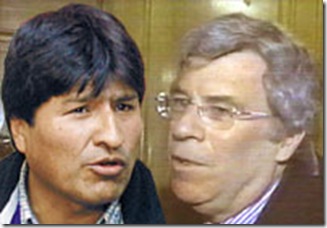
En el cable, el entonces embajador David Greenlee señala que el discurso inaugural fue “un cajón de sastre”, “largo e inconsistente”, indicando que “criticó a una amplia franja de la sociedad boliviana, incluidos los gobiernos anteriores, la prensa y el Tribunal Electoral”, agregando también que “Las señales contradictorias del discurso de Morales hacen difícil decir si va a gobernar democráticamente, en interés de los pobres y oprimidos, o si seguirá un camino más autocrático”.
El cable, que lleva el código 000167, dice que en su discurso “plagado de inconsistencias” el presidente “se desvió de un tema a otro”, dejando entrever las dificultades bilaterales que surgirían en torno al tema del narcotráfico: “Morales manifestó su intención de trabajar con los Estados Unidos para combatir el narcotráfico, pero dijo más tarde que los Estados Unidos no deben consumir cocaína `como una excusa para dominar a nuestro pueblo´ y que Bolivia seguiría ´el diálogo sin condiciones, sin chantaje´”.
El informe diplomático concluye diciendo que, en base a ciertos pasajes del discurso presidencial, se puede prever “un futuro oscuro para la democracia boliviana”.
UNCLAS LA PAZ 000167
=> Recibir por Whatsapp las noticias destacadas
SIPDIS
SENSITIVE
SIPDIS
E.O. 12958: N/A
TAGS: PGOV PREL ECON BL
SUBJECT: MORALES INAUGURATION SPEECH: A MIXED BAG
1. (SBU) Summary. Evo Morales’ January 22 inauguration speech was many things: long, rambling and inconsistent, but also direct, passionate and heartfelt. He celebrated international support for his government from the United States, Venezuela and Cuba. But in a less-than-presidential manner, he also criticized a wide swath of Bolivian society, including previous governments, the press, and the National Electoral Court. The mixed signals from Morales’ speech make it difficult to tell whether he will govern democratically, in the interests of the poor and oppressed, or follow a more autocratic path. End summary.
2. (SBU) Evo Morales’ January 22 inauguration speech was many things: long, rambling and inconsistent, but also direct, passionate and heartfelt. Morales spoke for almost two hours, much of it without notes. He swerved from one topic to another, at times falling back on familiar campaign stump speeches. In his remarks, riddled with inconsistencies, Morales declared his intent to work with the United States to fight narcotrafficking, but later stated that the United States should not use cocaine "as an excuse to dominate our people" and that Bolivia would pursue "dialogue without conditions, without blackmail." Likewise, while recognizing the importance of free trade, he called for an end to "radical neoliberalism". At the same time, Morales’ remarks came across as passionate and heartfelt, particularly when he spoke about exclusion of Bolivia’s indigenous and poverty. His resolve to bring about change in Bolivia was clear in his statement that "parliament will be the army of national liberation, of the battle for the second independence; if it doesn’t do it, the social movements will".
3. (U) Morales celebrated international support for his government, from the United States (citing the presence of WHA A/S Tom Shannon as evidence of such), Venezuela and Cuba. He thanked Cuba and Venezuela for their aid in fighting illiteracy in Bolivia, and gave a special nod to Chile by explicitly recognizing President Lagos’ attendance.
4. (SBU) At times during his speech, Morales also came across as less than presidential, as though he were still a candidate on the stump. He criticized previous governments, the press, and the National Electoral Court. He attacked Jorge "Tuto" Quiroga (implicitly) for leaving Bolivia to live in the United States and returning to re-enter politics, former President Jaime Paz Zamora for corruption, and former Presidents Gonzalo Sanchez de Lozada and Carlos Mesa Gisbert for their role in Bolivia’s "neoliberal" failures. Despite his overwhelming win on December 18, he also repeated his charge against the National Electoral Court for allegedly allowing MAS voters to be turned away from the polls. Finally, he chastised the media, which was sometimes critical of him during the campaign, for "attacking" him prior to the election, labeling them as "terrorists".
5. (SBU) Comment: The mixed signals from Morales’ speech make it difficult to tell whether he will govern democratically, in the interests of the poor and oppressed, or follow a more autocratic path. Depending on which parts of Morales’ speech are highlighted, it could be seen as a positive beginning with some appropriate signals for the international community, or viewed, based on its more ominous notes, as a sign of a darker future for Bolivian democracy. Morales’ unpolished comments revealed his inexperience, but also his belief that he can bring about drastic change by alleviating poverty and discrimination. Unfortunately, his rhetoric did not provide any concrete indications regarding how he might do this. In the next few weeks, we’ll see which parts of his speech reflect his true intentions. End comment.
GREENLEE